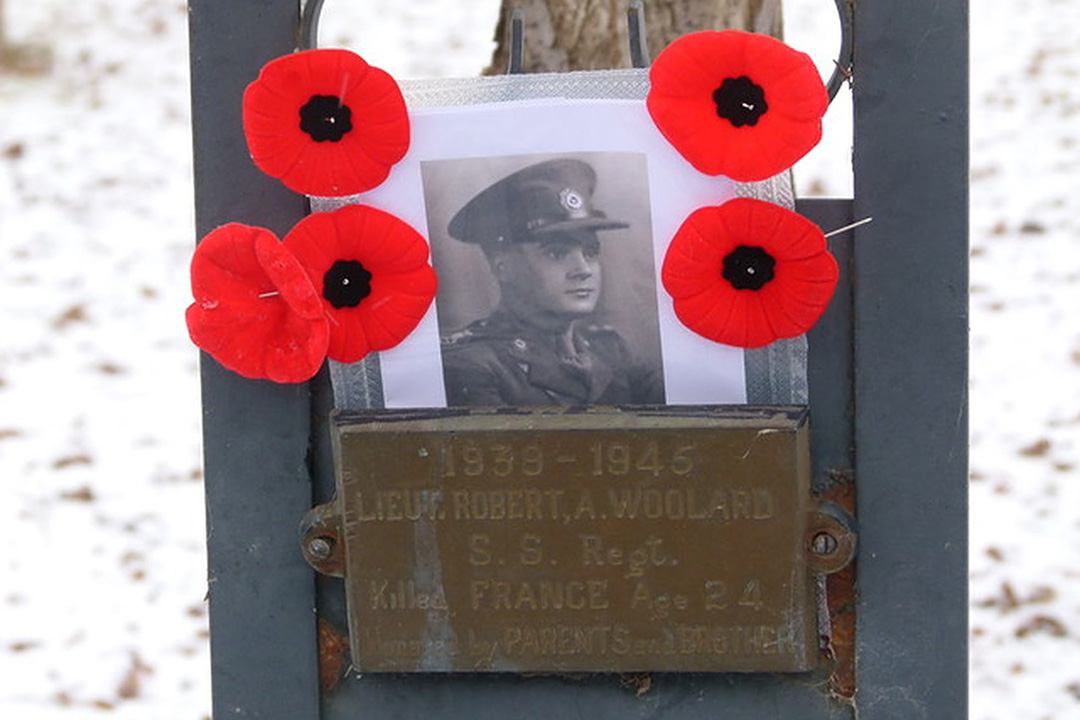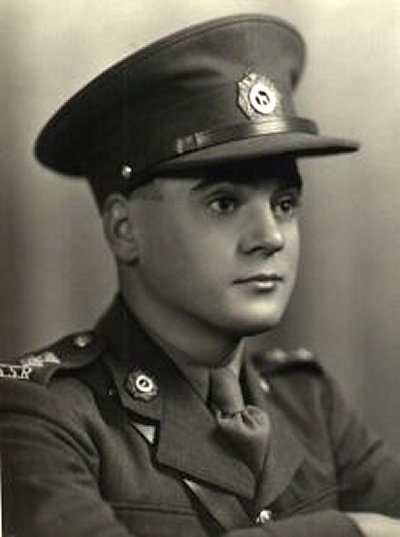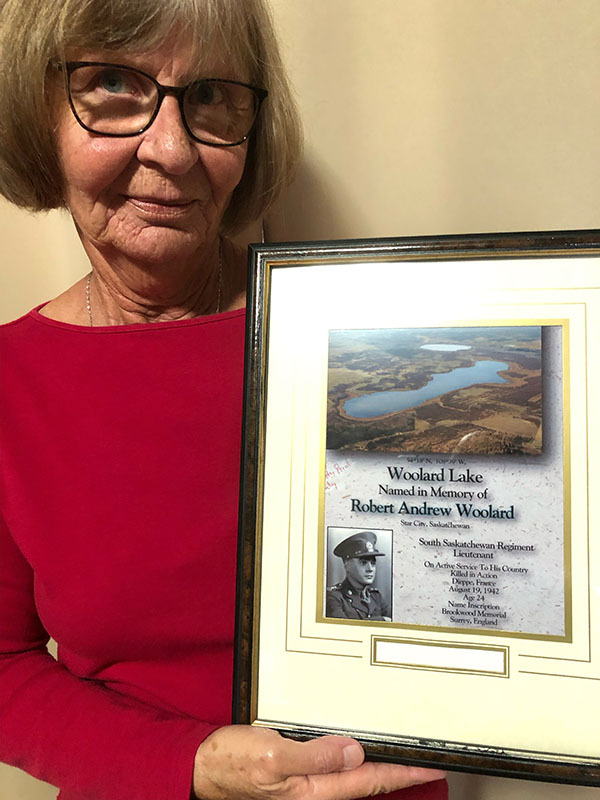
USask remembers: Honouring one of the fallen heroes of Dieppe
As Remembrance Day approaches, the University of Saskatchewan (USask) pays tribute to the service and sacrifice of former students, staff and faculty.
By James ShewagaHe was on his way to following in his father’s footsteps and becoming the next lawyer in the family, but Robert Andrew Woolard was determined to answer the call of duty for his country in the Second World War.

Two years after leaving law school at the University of Saskatchewan (USask) to volunteer to serve overseas, Lieutenant Woolard became one of the 907 Canadians killed during the ill-fated Dieppe raid in France 80 years ago on August 19, 1942, just seven days after celebrating his 24th birthday.
For the Woolard family from Star City – 175 kilometres northeast of Saskatoon – the news was devastating, the kind one never truly recovers from.
“It was before I was born, but I know it was pretty devastating for my family,” said Bob Woolard of Saskatoon, a 1974 USask graduate who was named in honour of his late uncle. “Being the Scottish family they were, my grandparents (Charles and Helen Woolard) weren’t big on displaying emotion, but I know my father (William) was pretty upset about it. He was his only brother and there were only two boys in the family. I think they were very close and it affected him deeply.”
In one of the first waves of the South Saskatchewan Regiment to hit the beach three kilometres from Dieppe, Lieutenant Woolard was killed instantly while leading an attack on his objective in the town of Pourville, the site of a sacred monument for the Canadians who gave their lives on that tragic day. Before he was wounded and captured by the Germans, the regiment’s commanding officer, Lieutenant Colonel Charles Cecil Merritt carefully removed Woolard’s watch from his body and later successfully sent it home to Woolard’s parents, as he spent the next three years as a prisoner of war.
The loss of his brother deeply affected William, whose congenital heart condition kept him from combat, but he went on to serve his country as a sergeant in the dental brigade, providing health care for soldiers heading overseas from 1939 to 1945. In 1949, William graduated from USask, finishing the law degree that Robert had started nine years earlier.
“He didn’t like to talk about the war. It was just too painful for him,” said William’s daughter, Helen Woolard McPhail of Warman. “Dad was going to be a dentist and Robert was going to be the lawyer in the family, because my grandfather was a lawyer. Dad didn’t want to be a lawyer, he wanted to be a dentist. But after Robert died, he felt he had to go into law, to follow his father. So, he became a lawyer and practiced in Tisdale all his life.”
For both Bob and Helen, there is a feeling of solemn pride for the service and the sacrifice of the uncle they never had the chance to get to know.

“There is a sense of pride, but more just sadness for what could have been, because so many lives were lost that day,” said Helen, who made the pilgrimage 330 kilometres northwest of Saskatoon to visit the Saskatchewan lake named in honour of her late uncle – Lake Woolard. “My brother and I have always felt proud of him. And that is why we researched to find the lake named in honour of our uncle, and I actually went up there years ago. It was a quiet moment, and it was memorable just to find it and just to be there.”
Lieutenant Woolard is also memorialized in Saskatoon’s Woodlawn Cemetery, where a service and tree dedication was held in 1948 in honour of the members of the South Saskatchewan Regiment who fell at Dieppe. He is also commemorated at the Brookwood Memorial in Surrey near London, England, honouring soldiers whose bodies were never recovered or whose graves were unmarked in the theatre of battle. There are 187 Canadian soldiers buried at the Dieppe Canadian War Cemetery whose identities and precise final resting place were never determined, including Lieutenant Woolard.
Woolard was one of 2,500 USask students, staff and faculty who served in the Second World War, and one of the 202 who never came home. Like so many members of his generation, Woolard felt compelled to serve, joining the University of Saskatchewan’s contingent of the Canadian Officers Training Corps shortly after earning a Bachelor of Arts degree in 1940 and entering law school before volunteering to serve overseas.
During the Second World War, College of Law dean Frederick Cronkite claimed that 26 per cent of living students and graduates of the college had answered the call to serve – as noted in former USask dean of law and current interim College of Education dean Dr. Beth Bilson’s (PhD) 2017 Saskatchewan Law Review paper Refiner’s Fire: The University of Saskatchewan College of Law in Times of Depression and War.
“It was definitely a different time and Canada was certainly a different country then, than it is now,” said Bob Woolard. “People like my uncle had a considerable amount of pride and desire to serve their country. So, there is pride, and sadness, of course. And I have pretty strong feelings about him, considering that I never even met the man.”
For both Bob and Helen, questions remain, as well as frustration over the decision to go ahead with the disastrous raid on Dieppe. In just nine hours on that fateful day, 907 Canadians were killed, 2,450 wounded and 1,946 captured, out of the total Allied force of close to 6,000 soldiers.
While many military historians have written that lessons learned at Dieppe helped save lives on D-Day two years later, the planners of the Dieppe raid have long been criticized for sending so many soldiers to their demise without the proper air and naval support.
“Certainly, there were lessons learned, but what an expensive price to pay for those lessons learned,” said Bob Woolard. “I certainly wouldn’t say that Dieppe led to the victory at D-Day. It was a valuable lesson, but the raid should have been called off, and there was no way in hell they should have gone there.”
For the Woolard family, there remains a solemn pride in the service and the sacrifice of the relative they never knew, along with treasured photos, records, and memorials of remembrance, at home and abroad. There is also the cherished watch and letter the family received from Commander Merritt, the Victoria Cross winner whose heroics at Dieppe that day helped half of the South Saskatchewan Regiment soldiers who landed on the beach that day escape back to England, while he was taken prisoner.
The commanding officer’s letter to Lieutenant Woolard’s parents – written while he was interned as a prisoner of war – remains as poignant today as it was all those years ago:
I have delayed writing you as our mail is limited, but I am afraid, inexcusably long.
I do want to express to you my most sincere sympathy in your loss of your very loveable and very gallant son. In my comparatively short acquaintance with him, I had come to know him as a most dependable officer and one of the most popular in the regiment, with both officers and men. He was bright and cheerful always and always the brunt of good-natured joking in the mess, the unfailing sign of universal popularity.
I saw him after he was called, and took his watch from his wrist, which I shall return to you in due course. He lay on his face, within a few yards of the position that he and his men captured. He was killed instantly and knew no pain. I am sure as he looked most peaceful, he died as many men would want to do, leading his men in an attack. I think you would like to know that even in the moment when I realized with such a shock of sorrow that Bobby was lying there, I couldn’t help noticing how like in death, he was to his nature in life, neat and trim in his dress and vigorous attitude, which was so like his bright, alert self. His loss so great to you, is also deeply felt by his brother officers and his country.
With deepest sympathy,
Lieut.-Col. C.C. Merritt
Remembrance Day ceremony at USask
The University of Saskatchewan will host its annual Remembrance Day wreath-laying ceremony at the Memorial Gates on campus on Friday, Nov. 11 at 1:30 pm.
The Memorial Gates were unveiled in 1928, with a ceremony held there every year for the past 93 years in honour of the service and sacrifice of Canadian veterans and those who continue to serve. The Remembrance Day ceremony is open to all USask students, staff, faculty, and alumni, as well as members of the community.

